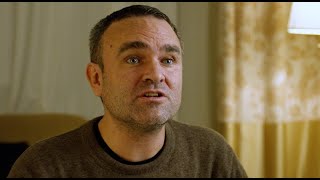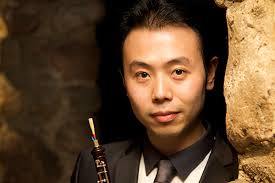Composer Jörg Widmann: The most dangerous key is copy-paste
mainThe German musician, one of the most performed contemporary composers, discusses Covid and creativity with Zsolt Bognar in the latest long-awaited edition of Living the Classical Life.
‘I write by hand,’ he says. ‘The most dangerous key is copy-paste.’






But copy paste is exactly what his music sounds like
Just my opinion, of course
A much vaunted teacher/guru of Alma Deutscher
The interview was taped in 2019, before COVID.
Evident by the fact they are in the same room and not wearing a mask.
Two things I dread most –
seeing my obit on SD
having to say that I’m living the classical life.
Luxury. What a fortunate life you must have!! Being dead and still about to read your obit. That’s real skill, right there, which few people have. Or so I’m told.
Mark Twain managed it.
Not keen on his compositions, but seems like a nice person.
“Nett ist die kleine Schwester von Scheisse.”
‘I write by hand,’ he says. ‘The most dangerous key is copy-paste.’
This statement makes absolutely no sense.
I don’t entirely agree with him but it makes sense.
He’s suggesting that copy and paste facility leads to sloppy composing. Handwriting supposedly ensures you’re more inhabited in your work.
I’d argue that it doesn’t have to be one or the other. A combination of both is viable.
The more composers are inhabited, the more they have to put effort in their work, and the results will be better. (Good example: Maurice Ravel. Bad example: W.A. Mozart, but he was exceptional anyway.)
It’s cryptic. Key is an allegory to a broader theme.
But could it be a quip to another’s plea that
“Music should be Beautiful “. ?
My point was, if Widmann writes by hand he HAS no copy-paste key.
I reiterate: the statement as posted makes no sense.
Sense of allegory bypass
Before people would take the trouble to listen what this man has to say, it would be wise to first take notice of his work, so that it can be put in perspective:
https://www.nytimes.com/2020/03/20/arts/music/jorg-widmann-carnegie-hall.html
https://www.youtube.com/watch?v=8TFh4JmkNtI
What do these works ‘say’? That the composer actually would like to write ‘normal’, ‘oldfashioned’ music but only allows himself to do that from a postmodern cage, so that he cannot be accused of being ‘conservative’.
It is a case of German Berührungsangst for their own tradition, because of a short dark period of history.
Indeed. To the many visiting cave dwellers, the music is much more than innocuous or even offensive, it’s stimulating, compelling with a huge palette of colours, and most of all, joyous
Copy-paste key? I don’t have one on my keyboard. But his point is good. His quotations from other works (for example from the Kyrie of Bach’s B minor Mass near the beginning of his Messe für großes Orchester) are meaningful and carefully integrated. Pace Borstlap, Widmann is a good, perhaps even great, composer, who seems to have got past all the angst about modernism and post-modernism, and just writes music.
I wish that were true. Copying and pasting things from old works into your own music is a sign of not having integrated the thing that you apparently like very much, it’s postmodern thinking, like picking things in a shopping mall. It is still watching the desired thing from behind mental bars, or like viewing the beauties in a magazine instead of going-out and meet some people. But he can’t be blamed – in Germany, its own musical tradition is burdened by recent history and looking behind that wall appears to be extremely hard. It will take a long time for that wall to fall down, because it is an emotional one, not a physical one.